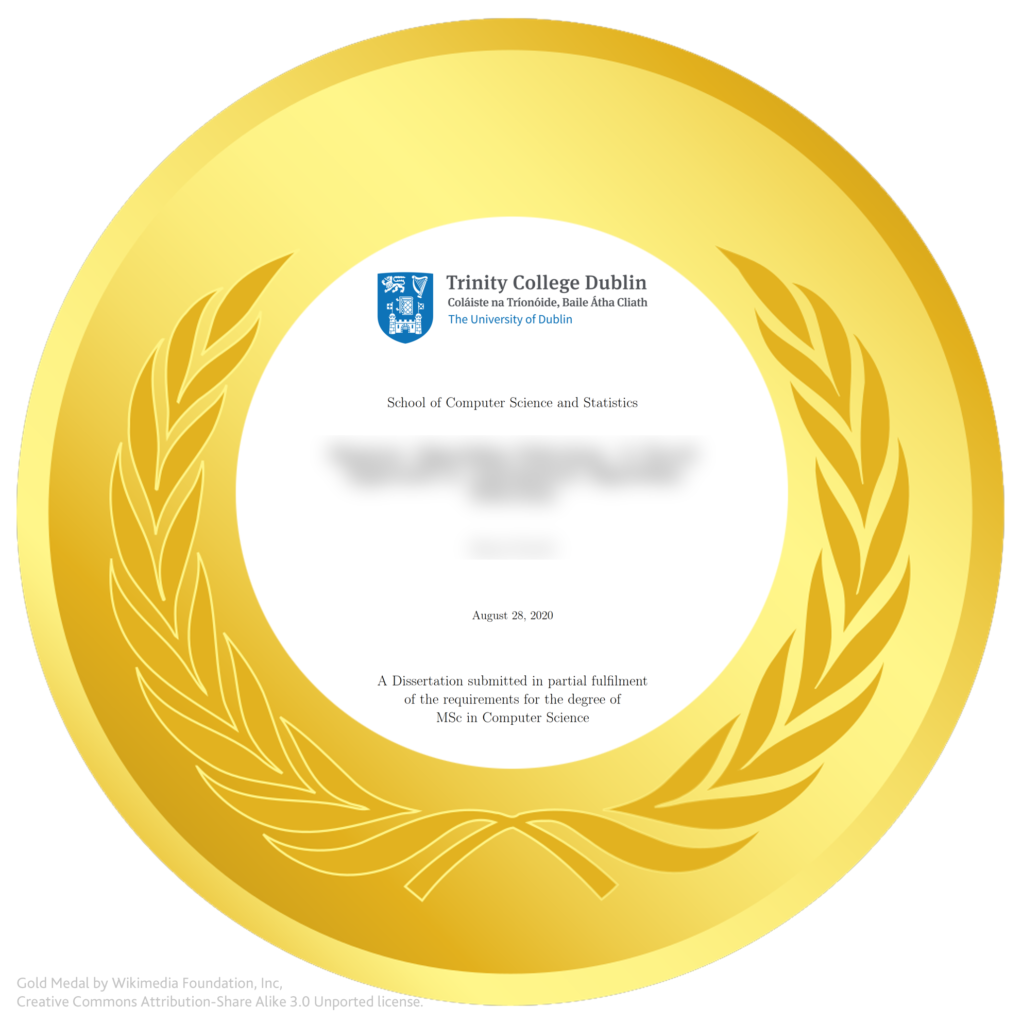In the past academic year, we supervised eleven Bachelor and Master students at the School of Computer Science at Trinity College Dublin.
We are delighted that all our students did very well. Ten (91%) even received a ‘distinction’ for their thesis with marks of 73 and higher. For those not being familiar with the Irish marking system: 70 or more marks are a first-class degree and achieving this at Trinity College Dublin, Ireland’s top university, is quite an achievement. More than one-third of our students (4; 36%) even achieved marks of 80 and above, which is, frankly speaking, phenomenal.
Marks for Bachelor’s and Master’s theses at Trinity are given by the student’s supervisor and a second reviewer who is randomly chosen from the academics at the School of Computer Science of Statistics. Both reviewers read the thesis and submit their marks independently from each other. Often, the marks suggested by the two reviewers differ significantly. This is no surprise as the two reviewers typically have different backgrounds, knowledge, and expectations. Not this year though for our students. The marks proposed by myself and the second reviewers were extremely close for nine of our students (89%). The difference was just 3.5 points or less (e.g. we proposed marks of 81 and 84 or marks of 74 and 75).

Given the excellent work of our students, it may not come as a surprise that a large number of them, including two students from the previous year, went the extra mile: They published their work as preprints, at workshops or at conferences including the prestigious ACM Conference Series on Recommender Systems.
Anand, Rohan, and Joeran Beel. “Auto-Surprise: An Automated Recommender-System (AutoRecSys) Library with Tree of Parzens Estimator (TPE) Optimization.” In Fourteenth ACM Conference on Recommender Systems, 585–587. RecSys ’20. Virtual Event, Brazil: Association for Computing Machinery, 2020. https://doi.org/10.1145/3383313.3411467.
Tyrell, Bryan, Edward Bergman, Gareth Jones, and Joeran Beel. “Algorithm-Performance Personas‘ for Meta-Learning and Automated Algorithm Selection.” In 7th Workshop on Automated Machine Learning (AutoML) co-located with the 37th International Conference on Machine Learning (ICML), 2020.
Molloy, Paul, Joeran Beel, and Akiko Aizawa. “Virtual Citation Proximity (VCP): Empowering Document Recommender Systems by Learning a Hypothetical In-Text Citation-Proximity Metric For Uncited Documents.” In 8th International Workshop on Mining Scientific Publications (WOSP), co-located with the ACM/IEEE Joint Conference on Digital Libraries (JCDL), 2020.
Arambakam, Mukesh, and Joeran Beel. “Federated Meta-Learning: Democratizing Algorithm Selection Across Disciplines and Software Libraries.” In 7th Workshop on Automated Machine Learning (AutoML) co-located with the 37th International Conference on Machine Learning (ICML), 2020.
Carroll, Oisín, and Joeran Beel. “Finite Group Equivariant Neural Networks for Games.” In arxiv 2009.05027, 2020.
Grennan, Mark, and Joeran Beel. “Synthetic vs. Real Reference Strings for Citation Parsing, and the Importance of Re-training and Out-Of-Sample Data for Meaningful Evaluations: Experiments with GROBID, GIANT and CORA.” In 8th International Workshop on Mining Scientific Publications (WOSP), co-located with the ACM JCDL conference, 2020.
Gupta, Srijan, and Joeran Beel. “Auto-CaseRec: Automatically Selecting and Optimizing Recommendation-Systems Algorithms.” OSF Preprints, (2020). doi:10.31219/osf.io/4znmd.
Marwah, Divyanshu, and Joeran Beel. “Term-Recency for TF-IDF, BM25 and USE Term Weighting.” In 8th International Workshop on Mining Scientific Publications (WOSP), co-located with the ACM JCDL conference, 2020.
Rawat, Rohit. “Virtual Proximity Citation (VCP): A Supervised Deep Learning Method to Relate Uncited Papers On Grounds of Citation Proximity.” In arXiv: 2009.13294, 2020.
0 Comments